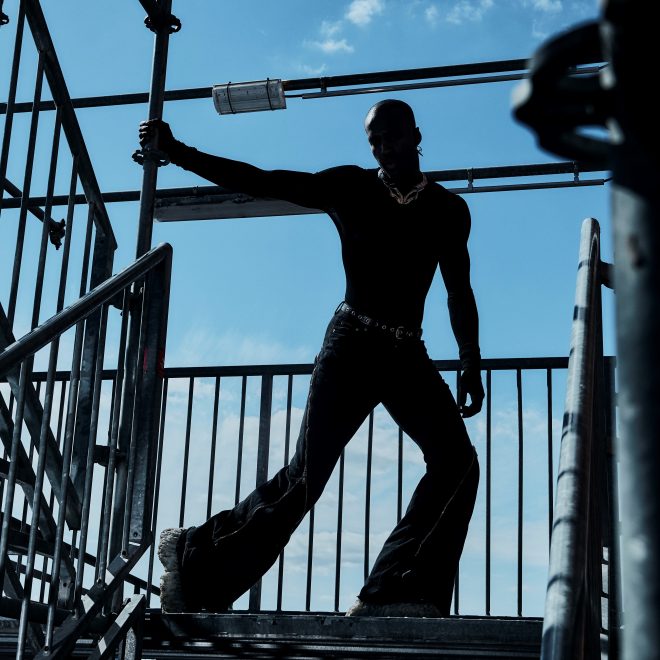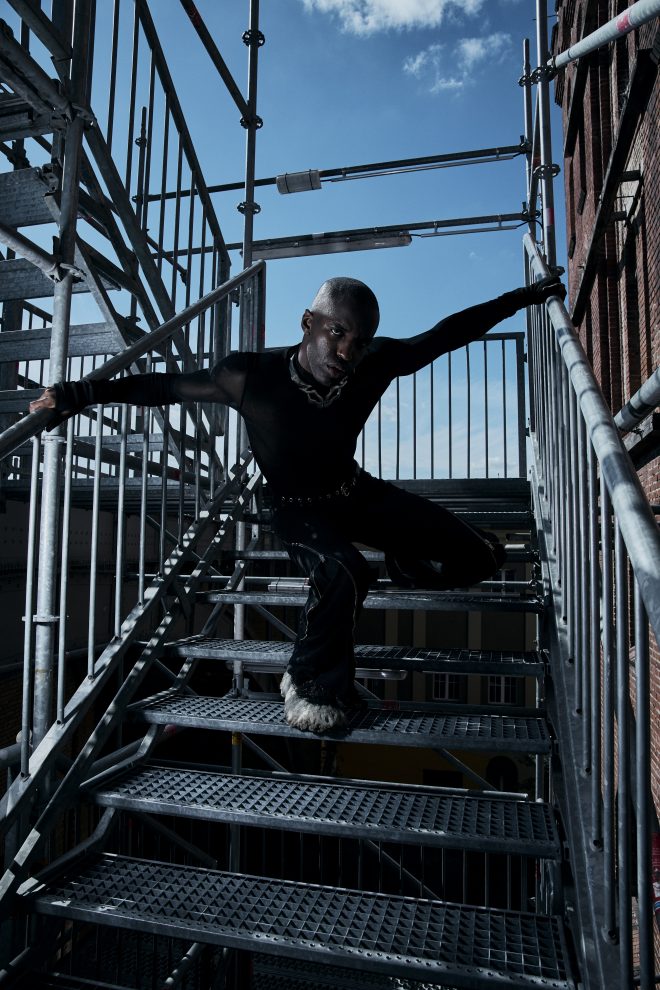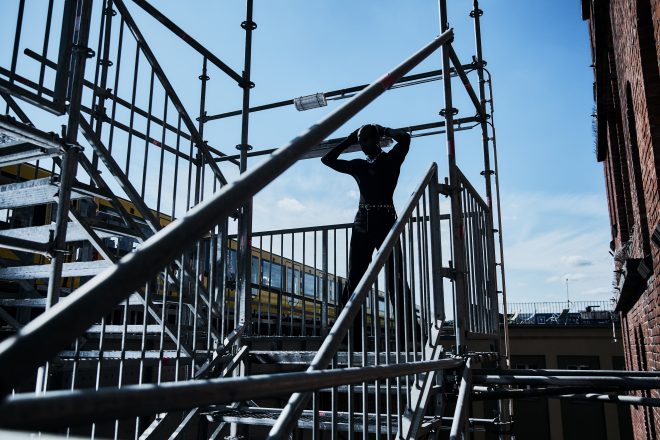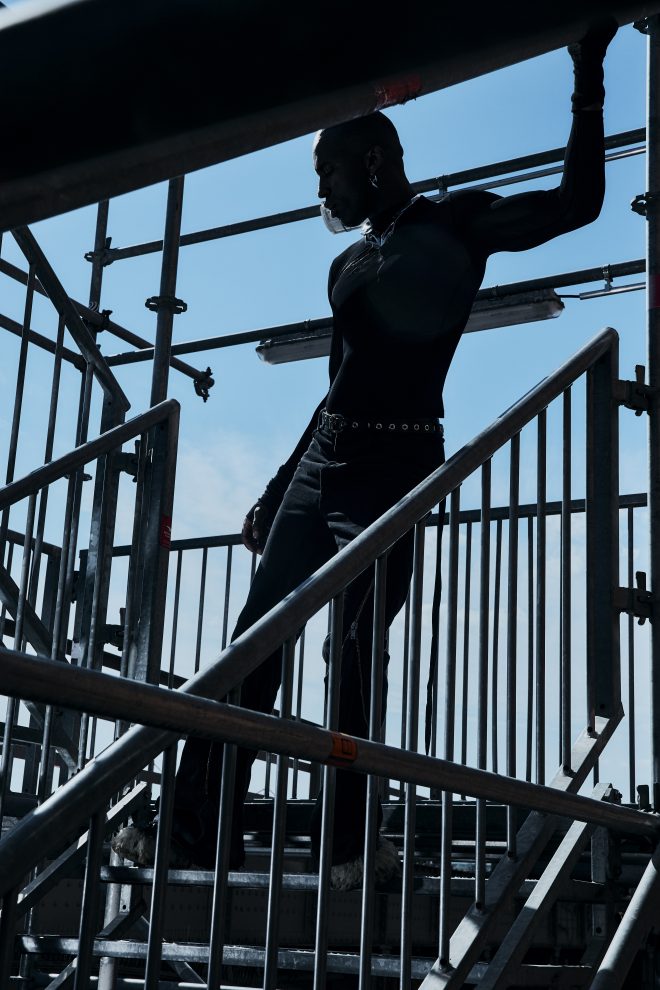ALI3N: between silence and sound

There is something disarming about ALI3N. His energy is not loud; it is magnetic, the kind that draws you in before you even realize you have stopped thinking. Based in Berlin but carrying the weight of many worlds from Jamaica to Ethiopia to North Rhine-Westphalia, he does not just play techno; he channels it. His sets move like ceremonies, each beat a pulse of honesty, each silence a mirror.
Talking to him, you feel it immediately. Music is not an escape for him; it is survival. It is how he turned loss into light, how he learned to breathe through rhythm when words stopped working. Everything about ALI3N feels intentional, from his precision in the booth to his quiet devotion to care, community, and emotional truth.
In this interview, we talk about grief, purpose, and patience; about finding strength in stillness and beauty in brokenness. ALI3N does not perform emotions; he reveals them. What he is building is not just sound. It is healing.
THE LANGUAGE OF SURVIVAL
For ALI3N, music has never been about sound alone. It has always been about feeling, about translating emotion into vibration. His earliest memories are filled with rhythm, melody, and presence; not from a stage, but from home.
“I started playing piano as a kid and later switched to alto saxophone during school. My dad used to collect reggae tapes, and we listened to them everywhere, at home, in the car, on weekends. My mum was and still is a huge Michael Jackson fan. The love and energy we felt when we listened to music together were unforgettable. That is where I learned that sound can hold emotion in a way words never could.”
Those early encounters with sound laid the foundation for his later identity. Techno entered his world almost by accident, through late-night gaming sessions and online radio. What caught him was not the repetition, but the emotion hiding inside it.
“Techno came later, when I was around twelve or thirteen. I used to play online games and consistently had techno radio stations playing in the background. That was when I realized how emotional techno can be. It was not just rhythm or function. It carried mood, tension, and release, everything life does.”
Then came the moment that reshaped everything. Loss changed the way he breathed, and sound became his only form of language.
“The moment it shifted from passion to lifeline was when I lost one of my parents. Suddenly, music wasn’t just something I did. It became the only space where I could breathe properly. It helped me process things that were too heavy for words. It became a way of surviving, of turning pain into movement, and silence into meaning.”
Grief, for ALI3N, was not an ending but a recalibration. It slowed time down and turned his perspective inward.
“Losing a parent changes your sense of time. Before that, I always felt like I had to get somewhere fast, to prove something. But grief slows you down. It humbles you. You realize that purpose isn’t about achieving more, it’s about being present in what’s real.”
That loss did not fade. It evolved, becoming a creative force rather than a wound.
“I don’t think grief ever leaves you; it just changes shape. For me, it turned into sound. When I create or play, I’m not trying to make people sad or emotional. I’m trying to show that beauty can come from broken places. It’s not performance. It’s release. It’s honesty.”
He describes healing as a rhythm of its own, one that refuses to be rushed.
“Patience came from accepting that healing doesn’t happen on your schedule. It occurs in layers, like music, with recurring themes that sound different each time they return.”
That sense of awareness has become the moral spine of his artistry. Every decision, from his gigs to his collaborations, stems from the same quiet ethics: honesty, care, and service.
“For me, honesty means playing or creating only when I actually feel something. I can’t fake energy, not on stage or in the studio. I’ve learned to say no to things that look good on paper but don’t align with what I stand for.”
“Care and service are significant parts of my process, too. Music is a way of giving, not just entertaining. When I play, I try to hold space for people. That might sound spiritual, but it’s really about being human, about connecting in a way that feels safe and real.”
He sees ALI3N not as an alter ego, but as a boundary, a bridge between what he shares and what he protects.
“Setting boundaries is still a learning process. ALI3N is me, but it’s also my protector. It allows me to share emotions openly, but also to step back when I need to. The person behind it requires silence, grounding, and real connections to stay healthy. The art can only stay honest if the person behind it is okay with it.”

REVELATION, NOT PERFORMANCE
For ALI3N, the name itself is not a disguise but an invitation. What sounds like distance is actually his way of coming closer. His art moves between the mystical and the human, exploring the edges of emotion without losing its truth.
“ALI3N is about exploring the unknown, but it is not a mask. It is a bridge between what I feel inside and what I put into sound. Not hiding but revealing means allowing people to see my emotions, my vulnerabilities, and my energy without filters. It is about creating honesty in a space that often thrives on spectacle.”
His approach to techno feels like an act of exposure rather than rebellion. Every track, every set, every shift in tone is a way of showing that fragility and force can coexist.
“Right now, through my music, I am revealing the tension between vulnerability and strength. I want people to feel that it is okay to be raw and honest. The tracks, the sets, the frequencies are all invitations to enter a space where emotion is not just performed, it is lived and shared.”
That emotional honesty extends beyond the club. Rooted in both Jamaica and Ethiopia, ALI3N’s sense of belonging is as global as it is personal. Through his family, he found not only rhythm but responsibility.
“Both Jamaica and Ethiopia are home to me. My dad is Jamaican, my mum is Ethiopian, and both cultures are a big part of who I am. My mum founded an NGO in Ethiopia that gives children a place to go after school, where they can eat and feel safe when their families cannot afford it.”
He speaks of that connection with tenderness, describing it as the moment where music and care truly intertwine.
“Through her work, I suddenly felt like I had eighty new little siblings to care for. That connection made me want to support the NGO through my music and to use what I do to give something tangible back.”
ALI3N’s way of giving back is quiet but concrete. His aim is not charity, but continuity.
“It is not about symbolic gestures or short-term projects. It is about helping to sustain something that already exists, something built on love and care. I plan to use my platform to keep that space alive, to grow it, and to show that community and art can feed each other in more ways than one.”

THE SOUND OF RESILIENCE
As his debut EP approaches, ALI3N finds himself in a new phase of expression. The upcoming release, built around emotion rather than genre, feels like a diary translated into frequencies.
“The music on this first EP is very personal. Each track holds a different part of my journey, but one in particular means a lot to me. It is called Ras Dashen, named after the highest mountain in Ethiopia. The track carries memories from a trip I took there as a teenager with my family and my stepfather, who I later lost. That journey was full of challenges, fear, beauty, and moments of closeness that I will never forget.”
The record feels like a meditation on memory, loss, and endurance.
“For me, the track carries melancholy, grief, and strength at the same time. Ras Dashen is not just about loss. It is about resilience and about finding power in vulnerability. The whole EP follows that emotional current. It is hypnotic, emotional, and raw, but still hopeful. It shows where I am right now, grounded, grateful, and still evolving.”
That evolution is most visible behind the decks, where ALI3N turns dancefloors into collective catharsis.
“When I play, I do not see it as just a set. It feels more like creating a conversation without words. Every track is a sentence, every transition a shift in emotion. I build my sets cue-point-precise because I like to have control over how the energy flows, when to hold tension, and when to let it breathe. That structure gives me the freedom to go deep and stay connected with the crowd while keeping everything intentional.”
His discipline is technical, but his intention is emotional.
“I start my sets slowly and steadily, usually around 135 to 140 BPM. That pace gives me space to shape the atmosphere with intention. I have no problem taking over after someone who played at 160 BPM, because energy is not only about speed. It is about depth, tension, and the ability to hold people’s attention without rushing. When the groove is right, people will follow you wherever you take them.”
In ALI3N’s world, every set is a story of contrast, where darkness and light constantly shift places.
“I want my sets to feel like release, but also like reflection. There are moments of pressure, intensity, and darkness, but also moments when everything opens up and you feel light again. It is about contrast. People need both to really feel alive.”
What he seeks is not applause but surrender. That rare silence when the crowd stops thinking and begins to exist together simply.
“The most beautiful part for me is when you can sense that the crowd has stopped thinking. When everyone is just there, breathing and moving together, it feels like time disappears for a while. That is when music becomes healing, not because it fixes something, but because it allows people just to be.”
And when it all ends, when the silence settles after the last beat, what remains is not the track, but the transformation.
“When the silence comes after, I hope they take that feeling with them. Not the drop, not the track, but the connection they felt inside that moment. If they leave feeling a little freer, then I did my job.”

THE POWER OF QUIET
Silence is not absence for ALI3N. It is an element, a collaborator, a way to hear the truth behind the noise. Between sets, he retreats into solitude to remember why sound matters in the first place.
“Silence has always been a big part of my process. It is not just the absence of sound; it is where everything begins. When I am alone and things get quiet, that is when ideas start to take shape. Silence lets me hear what is really going on inside. It clears out the noise so that emotion can come through more honestly.”
His relationship with solitude is not about distance, but about rhythm.
“I spend a lot of time in solitude, it is about recharging. When sound, people, and movement surround you constantly, you can start to lose touch with your own rhythm. Being alone helps me find that rhythm again. It is where I reset and reconnect with why I make music in the first place.”
To him, silence is not a void. It is the pause that gives meaning to everything that comes after.
“For me, silence is part of the composition. It is the space between the sounds, the tension before the impact. It teaches me balance. The same way a drop only works because of the calm before it, emotion only hits because of the silence that frames it.”
“When I return to the studio after a quiet period, it feels like the sounds have been waiting for me. The ideas come more naturally, and everything flows with purpose. In a way, silence is my co-producer. It keeps me honest, patient, and grounded.”
ALI3N has performed in some of Europe’s most respected venues, from Tresor and RSO in Berlin to FI Cologne and others across the continent. It is fascinating to see how these spaces have shaped his sound and the way he connects with a crowd.
“Tresor taught me patience and precision in energy control. RSO is intense every time I play there because, as a raver myself, I know how lower frequencies can dictate and navigate energies. At the end of the day, the crowd is the main impulse that makes me take something back to the studio. The combination of sound system, crowd, and club is what creates real moments. When I return to the studio, I try to translate those moments into textures and rhythms that carry the same intensity and honesty I felt in those rooms.”
CONTROLLED CHAOS
There is precision in ALI3N’s world, but never perfectionism. His music lives in the tension between emotion and restraint, a place where techno becomes language.
“Emotional honesty in techno means not pretending. It is about expressing what you actually feel, not what you think people want to hear. I have learned that if you try to force emotion, it becomes fake. When I produce or play, I try to stay connected to a real feeling. If it is authentic, people will feel it too.”
He describes his sound as a conversation between body and mind, one that refuses to compromise intensity for clarity.
“That balance between intensity and restraint is something I am always chasing. It is easy to go too far in one direction, to make something overly emotional or too mechanical. The sweet spot is where emotion meets precision. That is where the body and mind move together. For me, that tension is what gives techno its soul. It is controlled chaos. It builds pressure but never loses focus. It is powerful but never loud for the sake of being noisy. The emotion is in the details, in the repetition, in how the slightest change in frequency can shift an entire room.”
His music speaks quietly but hits deeply, moving through the room like a pulse you can feel more than hear.
“Emotional honesty is what connects people without them even realizing it. They might not know why they feel something, but they do. And that, for me, is the whole point of making music.”


